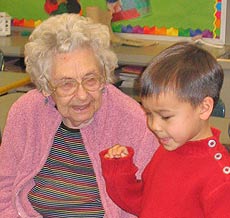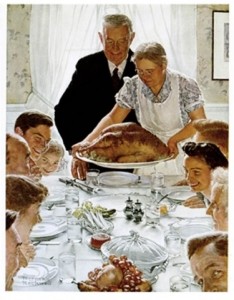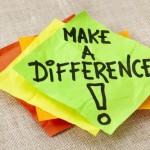Some of the elders in the Legacy Project gave a thoughtful, reflective review of their long lives, weaving their life lessons into that narrative. In many cases, their lessons came from encountering and overcoming adversity. Mamie, an 82-year old who lived through racial discrimination and hardship, but looks back on a very rich life.
My most important life lessons? Well, my marriage life, I was married about thirty years, it was a good marriage. And I was a schoolteacher; I enjoyed that for thirty years. And my parents were good, we weren’t rich, but I had good parents and that’s more important than having a lot of money. We would sit down to the table and eat. And church has become important to me in my older years; I was glad that I was in church.
I was born in the South and I had to sit in the back of the bus, but over the years I’ve become proud of my heritage. I think we’re special.
When I lost my husband, my children became the most important thing in my life. My kids were important, two went to college. One’s a teacher and one’s a chemist.
I’m not rich or anything, I’ve got a fair income, but the main thing is I thank God that I am living, and I do have aches and pains but they come with growing old.
A big choice for me was becoming a schoolteacher instead of a lawyer or something. I found that it’s not making as much money, but it’s been more enjoyable. Sometimes in teaching you not only teach, but you’re a friend to those kids. It’s not just teaching, it’s listening to the kids. And most of my time, being a Black teacher, I spent quite a bit of time with the white students and I found out they didn’t care about color. If you were their teacher and on their side, that’s all that matters. And my decision to go to church rather than going to nightclubs was good. I never got into drugs; I found that was a good way of doing it. I’d rather be in church than going to the bar every week and doing this and that.
Being honest is the main thing. When it’s all said and done, you have to do things the right way. There’s no outdoors or backdoors to lying. Somewhere along the line, you have to be honest with yourself. And by being honest with yourself, doors are open. I’m not “religious-religious,” but I do believe that if I do the right thing and so forth, things will open up for me.
About advice for young people: I found out two things by being a teacher: one problem is drugs, and the second problem is they are having babies. They’re out there, they never go to school, they start out on the corner selling drugs, and they don’t know anything about education and so forth. And we’re paying more money to house them in prison than we are if we could get them in and teach them the right and wrong. I cry about it sometimes to see our young people out selling drugs and they think that’s important. But their parents never taught them the right way of doing things.
Now, about getting old. As you grow older, take it day by day. I know we cry about this and that but we know we’ve got to grow old, so we should try and do the best we can. I retired about five or six years earlier than I should of, but I couldn’t help it because health problems set in and I had to. But I would say if you can, try to prepare for retirement. But take a day at a time and things will work out.









